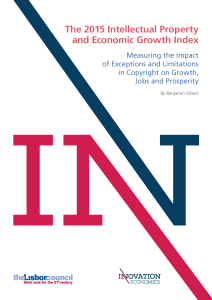 Last week, the Lisbon Council and Innovation Economics published The 2015 Intellectual Property and Economic Growth Index: Measuring the Impact of Exceptions and Limitations in Copyright on Growth, Jobs and Prosperity. The report by Benjamin Gibert examines limitations and exceptions to copyright in eight OECD countries, and then describes economic growth at the overall and industry level in those countries.
Last week, the Lisbon Council and Innovation Economics published The 2015 Intellectual Property and Economic Growth Index: Measuring the Impact of Exceptions and Limitations in Copyright on Growth, Jobs and Prosperity. The report by Benjamin Gibert examines limitations and exceptions to copyright in eight OECD countries, and then describes economic growth at the overall and industry level in those countries.
The key findings: “countries that employ a broadly ‘flexible’ regime of exceptions in copyright” have higher rates of growth of their overall economy, information technology & service sectors, and even traditional media sectors. Workers in these economies also fared better, enjoying higher wages overall, in the communications sector, and technology sector.
Gibert further notes other positive aspects of more open systems of copyright limitations and exceptions, such as “the promotion o0f education, independent research, free speech, user-generated content and text and data mining.” He argues that exceptions to copyright should not be viewed as being in conflict with stronger intellectual property protection. Rather, “the evidence suggests that broad and flexible exceptions to copyright embedded within a strong intellectual property framework may be the best way to achieve both simultaneously.




